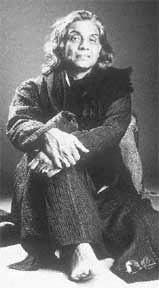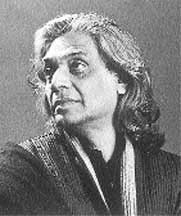- Home
- Archive -Apr 2000
- Storm in his he. . .

Storm in his heart
- In :
- Personal Growth
April 2000
By Nilima Pathak
Inspired by the extremes of beauty and suffering, Indian film-maker Muzaffar Ali finds a voice for his soul in art, poetry and Sufi thought
He’s one of those who needn’t lock the doors of his house while he’s away. What can be burgled anyway? The wealth of talent is all within him! Muzaffar Ali is film director, artist, fashion designer, Sufi follower and politician all rolled in one.
 |
Since he’s not an actor, one wonders how he manages to play such diverse roles. ‘I’m a person who feels things,’ says Ali. ‘I believe each work of art is a kind of meditation,’ he adds. Going by the evidence, one realizes that the real Ali is actually a painter. His other personae are but an outlet for this one. He clarifies: ‘Painting is my private life and film-making is my public life.’
Ali belongs to Kotwara, a village in the Indian state of Uttar Pradesh. The young Ali had only a brush for company and an ambition—to become an artist. The obstacle: his single-room dwelling couldn’t accommodate his canvas. A friend obliged and Ali found space in his house. His first painting exhibition was held in 1968. All went well, with one hitch: he had no buyers! Just one painting was sold. The rest had to be gifted.
The times change. And how! His works are now bought at the conceptual stage itself. What inspires or touches him the most? ‘I think the driving force in me is the helplessness of people. I feel that if you apply your mind creatively to this, you can do something about it. Actually that’s what makes me an artist! Painting to me is a way of clarifying my mind, creating a relationship with myself, which is so intimate. It has some kind of abstract feeling of love and poetry of love,’ Ali replies.
One could say that his life is full of surprises, even inspiring. A man on the move, his quest for Sufi sources of knowledge seems endless. It was in Kashmir (in north India) that Ali first became acquainted with the teachings of the Sufis. ‘Sufism takes the self to the self,’ he declares. ‘The flower has everything in its garden—fresh morning air, birds and trees. But is there an eye that gets moist on seeing any of these?’ he recites.
Breaking the rhythm he adds: ‘The experience of beauty and its impact on the heart is the biggest prayer.’ To him beauty means, ‘that moment of surrender when you confront His creation. It’s the ecstasy of seeing something in an instant. In music it could be tune or rhythm—something that surrounds you. If you can’t reach that, it means you miss the essential quality of beauty.’
The fine arts are, so to say, a mission with him. Ali is unfailingly charismatic. His frames tell you about the man’s accomplishments, his vision and quality as a thinker. He says: ‘I’ve been brought up in situations beset with contradictions, rife with trauma. I saw and felt when things were going wrong.’ The political and social turmoil he encountered evoked an intense response in him. ‘That became my basic temperament. And owing to that temperament, I’m an artist. I started sketching what I felt. But gradually began to feel that whatever I was doing was only one-dimensional. Maybe if it was translated on celluloid, it could communicate on a much bigger scale. Also my feelings could be transformed into a film,’ he states.
Gaman, a Hindi film on the angst of modern life, was the outcome. ‘An outlet for settling my creative imbalances,’ he says. Ali finds life in big cities stifling. Gaman portrays such sentiments. He explains: ‘Actually the urbanite is upset because issues of his environment, culture and livelihood are not being addressed. No one is thinking of him. So some holistic thinking is required to be able to eliminate that sadness and helplessness in him.’ His films always portray people’s helplessness and look at their sadness. ‘By doing so you make people sensitive to the cause of that sadness,’ Ali declares.
 |
He narrates a story: ‘A person went to Hazrat Ali, the mentor of Sufism. Hazrat Ali declared: ‘I have no assets, nothing to give to the world. Why have you come to me?’ The man replied: ‘I want nothing. You just smile. That’s enough!’ So love is a very strong force to bring about a positive change in society.’
Whatever the man undertakes, he does with passion. Attributing his success as a filmmaker to his sketches, he says: ‘I sketch out each and every scene. Making a film brings out the best in me. And the discipline of film-making has made me versatile.’ Arriving at a distilled emotion or peak of an emotion, so important to him, is what drives him to perfection in his craft.
Despite recognition, he didn’t get into routine filmmaking. ‘Had I done so, I would’ve moved from one film to another. But I go into a film with a certain amount of depth, taking a lot of time over it. After the completion of a film, it takes me time to grow out of it. So it creates obvious gaps. These gaps have to be filled with some kind of exercise-be it painting, which is my basic strength, or even designing clothes. Through designing I have been able to create employment and a relationship with my own village. This gives me the dimension of a designer. Thus I believe I have absolved myself of the blame that I am so much rolled in one,’ he laughs.
How content a person is he? ‘Very,’ he replies. ‘At the same time, restless. I’m content with myself but restless over the larger environment.’ Regrets, if any, could presumably be over his brush with politics. As if on cue, he adds: ‘I have an unfinished dream. That of completing my film Zooni.’
His multifaceted personality is a curious mix of feelings and ideas. He can talk about the harsh and ugly realities of life, as well as the rich and beautiful aspects in the same breath. There’s this story: A man went to a Sufi master and asked him: ‘How do you feel?’ The master said: ‘Like one who has arisen in the morning and does not know whether he will be dead by the evening.’ The man said: ‘But that is the situation of all men.’ To which the master replied: ‘Yes, but how many of them feel it?’
Needless to say, Ali does. He lives each moment of life fully. And doesn’t seem to plan for the next. A true Sufi, indeed. For Sufis don’t preach. They only teach. And can be understood. But only by people who seek.
To read more such articles on personal growth, inspirations and positivity, subscribe to our digital magazine at subscribe here
Life Positive follows a stringent review publishing mechanism. Every review received undergoes -
- 1. A mobile number and email ID verification check
- 2. Analysis by our seeker happiness team to double check for authenticity
- 3. Cross-checking, if required, by speaking to the seeker posting the review
Only after we're satisfied about the authenticity of a review is it allowed to go live on our website
Our award winning customer care team is available from 9 a.m to 9 p.m everyday
The Life Positive seal of trust implies:-
-
Standards guarantee:
All our healers and therapists undergo training and/or certification from authorized bodies before becoming professionals. They have a minimum professional experience of one year
-
Genuineness guarantee:
All our healers and therapists are genuinely passionate about doing service. They do their very best to help seekers (patients) live better lives.
-
Payment security:
All payments made to our healers are secure up to the point wherein if any session is paid for, it will be honoured dutifully and delivered promptly
-
Anonymity guarantee:
Every seekers (patients) details will always remain 100% confidential and will never be disclosed
